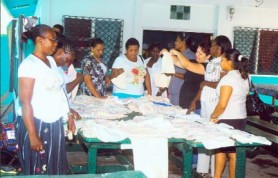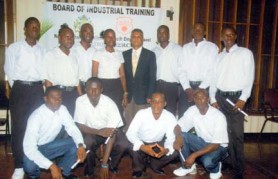More than 300 single parents who over the past year have undergone training in various areas will soon benefit from government assistance to start up micro businesses to economically empower themselves, Chief Executive Officer (CEO) of the Board of Industrial Training (BIT) Alana Brassington said.

Having gone through training in the areas of cosmetology, sewing, catering, Office Procedures and Information Technology among others, the 377 single parents are expected to receive vouchers for $65,000 each to assist them in their business ventures.
Meanwhile, some 1,750 young people between the ages of 15 and 25 have been trained under the National Training Programme for Youth Empowerment (NTPYE) in over 70 skills, causing Brassington to deem the work of the institute a success. But there is no data to support this conclusion as BIT has no way of tracking the young people who were trained to ascertain whether they have gained employment and if their lives have improved. However, it is expected that this will be remedied soon as the institute is in the process to establishing a database precisely for this reason.
The NTPYE project was launched by President Bharrat Jagdeo in 2005 and he had hoped that some 5,000 out of school youths would have been trained during that period. It is funded by government subvention and has been described as an initiative that is part of administration’s strategy to reduce the level of unemployment and improve the living standards of citizens.
According to Brassington, the NTPYE prepares young people to enter the job market with on-the-job training. And it does not train persons in abstract; the institute keeps abreast with the needs of the job market and trains persons to fill vacancies around the country.

The programme recently commenced training youths as driver-salesmen/women and heavy-duty operators as of last year, before there was a great demand for such persons.
500 more
According to Brassington, the single parent programme, which has received a $25 million government subvention, aims to train another 500 persons this year.
She said last year 412 persons were placed in training with 375 persons completing the programme.
The CEO said her office is now currently working on preparing the $65,000 vouchers for the single parents, which they would use to purchase basic tools to start their businesses.
“Once they have completed the programme they will get the assistance,” she told Stabroek News in a recent interview.
The institute only trains single parents from the single parent database since it would have had a verification process – all those who would have registered.
While the Ministry of Human Services and Social Security was preparing the national single parent database the parents were given choices on what sort of assistance they wanted. Some asked for day care assistance, others asked for small business grants and yet others for training. Those who asked for grants are the ones being trained even though there is another programme through public assistance which facilitates giving some start up funds to small businesses.
The database was created in an effort to assist single parents who are unable to provide for their children owing to various circumstances.
More applications needed
Meanwhile, Brassington told Stabroek News that the NTPYE is going full steam ahead with offering training to more youths and is currently accepting applications. The training is available in eight of the ten administrative regions and while some areas have seen a huge uptake by young people, in others more applicants are needed.
The NTPYE graduates would have received training in various disciplines including joinery, auto mechanic, plumbing, carpentry, welding and electrical and computer repairs.
The programme caters for youths between the ages of 15 to 25, which was the age range set by President Jagdeo.
However, Brassington said, the Ministry of Health has set out some requirements for persons entering the health programme even though it has allowed the institute to take persons who don’t meet all of the requirements.
“They have said to us if these people are going to be employed and if they are going to be able to access further training they must have three subjects CXC including a science subject and English,” Brassington said.
While the programme caters for school dropouts, persons who completed secondary school are taken for certain areas, mainly health. In the area of health the persons are trained as nurse aides, health care assistants and patient care assistants and they are trained at hospitals, health centres and dental clinics.
Giving some insight into the programme, Brassington said that the youths are giving on-the-job training but they do get classroom sessions which include life skills, English, Mathematics and sexual and reproductive health among others.
The programme was initially expected to be over a three-year period and it was hoped that some 5,000 youths would have been fittingly empowered to enter the job market. However, Brassington said the programme was “a little slow in getting off the ground” and as such the first phase was only completed in 2007.
The project’s life should have ended last year but it is continuing.
Last year 1,798 applicants were accepted for training but only 1,143 persons graduated because of “high drop-out rate particularly in Region Four.” Brassington feels that the drop out rate is higher in Region Four because there are a “whole lot of distractions [and] more choices available to young people.”
Too expensive
According to the head of the institute, training is offered in eight of the ten regions because it is unable to have a presence in Regions Eight and Nine; however persons from those regions can be trained in other regions. She said it was too costly to conduct training in those regions because of the travelling coupled with the fact that there are not enough businesses to employ persons who would have been trained.
Brassington explained that the training lasts for six months but not everyone commences training at the same time.
“It is difficult to place people in eight regions in one month, so you have about a three-month period in which you do training…,” she said, adding that persons graduate as soon as they complete the training.
The institute offers training in about 70 different skills area and the options “grow every year because one of the basic tenets of our programme is that we respond to the needs of society…”
BIT is in a very good position to know what skilled persons are in demand as it shares its office with the Central Recruitment and Manpower Agency, another branch of the Ministry of Labour, which tracks jobs and places persons in them.
“So they send reports to us on a weekly basis… we always have an eye on what the needs are out there,” she told this newspaper.
Touching on the driver-salesperson and heavy-duty training which commenced last year, Brassington said there was need in these two areas.
“I don’t have to tell you but those jobs are very much in demand,” Brassington said adding that the institute does not discriminate against any gender and as such women are also trained in those areas.
As expected only persons over the age of 17 can enter these two programmes. “They can come raw out of school like that. We send them to do the driver training; we pay for that. We pay for the driver’s licence, we pay for everything,” Brassington said.
In 2008 Information Technology and Office Procedures training programmes were started as according to Brassington employers were not willing to take persons who knew nothing about computers and this propelled the institute to begin equipping its apprentices with the basic knowledge. She disclosed that in 2008 the NTPYE collaborated with the French Oxygen Company and established a centre where training is done half of the day in class on two subject areas while the other half of the day apprentices are sent to worksites for on the job training. “The whole purpose is empowering people,” the CEO stressed.
Tracking
Probably the only shortcoming of the institute is its inability to track the persons who would have been trained. Brassington agreed that by tracking those persons the institute would have been able to garner how successful its efforts are and in this light she said they are setting up a database.
“Right now we don’t have system of tracking and it’s not easy to track; I don’t have the staff to accommodate that. What you need is a database and somebody to be responsible for that database and because we have been asked that question since the programme started we have decided now to start tracking,” she said.
The database would be funded by the United Nations Development Programme (UNDP) Enhanced Public Trust & Security (EPTS) programme and someone has already been hired and she has commenced tracking persons.
BIT has assisted the trainees in finding jobs and according to Brassington a number of large businesses would contact the institute and ask for persons in specific areas. As many as 12 persons are sometimes required by businesses.
Brassington also contacts businesses who advertise for a large numbers of persons to inform them that persons are being trained for their specific requirements. Sometimes the numbers required cannot be provided as the trainees may already be working.
“We have success stories and we know in an anecdotal way that two, three months after they finish our training in most programmes, between 50 to 60 per cent get jobs,” Brassington said.
BIT is a subvention agency and comes under the direction of the Ministry of Labour and it runs training programmes with the oldest being the apprenticeship programme that has been around since 1910.
That programme involves persons being sent to various places–such as GuySuCo–to be trained over a four-year period. It is not as successful as before as most businesses are finding it too costly to train persons.
Brassington said that a number of activities, including publishing a magazine, are planned to commemorate the programme 100th anniversary.





